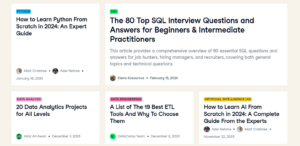Every decade has seen the introduction of pivotal technologies that transform how enterprises operate, serve customers, and grow their business. The last few years have seen the meteoric rise of artificial intelligence, which has upended industries in ways unimaginable.
Today, AI has seeped into every facet of an organization, from finance activities, supply chain management, manufacturing, and quality controls to sales and marketing.
In this article, we examine important ways artificial intelligence is making strides in how businesses interact and engage with customers, creating immeasurable benefits for both consumers and organizations.

Personalizing the Customer Experience
A staggering 90% of marketers believe that personalization can lead to improved profitability.
For customers, tailored communication and engagement can significantly elevate their brand experience, positively influencing the likelihood of purchasing a product. They could also contribute to customer satisfaction and loyalty. And happy and satisfied customers ultimately translate to higher sales and market growth for organizations.
But how can your business customize its interactions with potential and existing customers? Artificial intelligence could be the perfect solution.
AI-based tools can help you in several ways when personalizing how you approach and engage with your audience to drive purchases and develop lasting relationships.
Take Leadar, for example. It leverages AI to collect and organize large volumes of people data and instantly identify profiles that match your customer personas. This enables you to reach out to the right leads who could benefit from your product or service and improve your prospecting efforts with a higher targeting accuracy.
Leadar can also help you uncover more information about potential customers. As a result, your team could segment customers more effectively and build stronger connections through personalized interactions.
AI-powered CRM platforms such as Salesforce, on the other hand, allow you to manage all your customer data on a single interface so you can effortlessly analyze your databases and gain a deeper understanding of customers.
These tools could help assess customer needs, preferences, and aspirations and determine which stage of the buyer journey they are at. With such insights, you could tailor communications to help customers address concerns, revisit abandoned shopping carts, and access personalized promotions and information.
Improving Customer Support
AI has taken customer support to the next level with intelligent digital agents and customer service platforms.
Chatbots, for instance, have allowed businesses to provide 24/7 support using conversational AI and other advanced technologies.
Digital humans have taken simple chatbots up a notch with life-like features and the ability to identify and mimic human emotions. They’ve dramatically elevated the customer experience, minimizing the human-machine friction.
What exactly does this mean to customers? Thanks to such digital agents, they no longer need to stay in lengthy phone queues waiting for their turn to speak to a human agent during regular office hours. Instead, they can access product information from anywhere, anytime, and discover content faster at their convenience.
Moreover, many digital agents have multilingual capabilities, enabling customers to receive support in their language of choice.
When customers can access information faster, they can speed up the decision-making process. This, of course, means more sales for businesses.
AI-powered digital agents can also help significantly drive down costs by enabling enterprises to run their customer service operations with minimal staff and overheads.
Delivering Consistency and Accuracy
Tools that leverage artificial intelligence can help your business deliver consistent customer interactions and create a smoother omnichannel experience.
Take the case of chatbots, for instance. They can provide pre-defined responses to customer queries and eliminate the risk of errors and personal biases often experienced with human customer support staff.
HubSpot and similar platforms apply AI and other sophisticated technologies to trigger pre-designed emails. These can be based on filtering criteria and events such as a customer submitting a form, making an inquiry via phone, or adding a product to their shopping cart.
This level of consistency in communication is essential for minimizing mistakes, ensuring clarity, building credibility, and creating an improved brand experience.
Predicting Customer Requirements
An important benefit of artificial intelligence in enhancing customer interactions is anticipating customer needs based on past behaviors, demographic and psychographic information, and various other data.
This allows enterprises to remain one step ahead in responding faster to customer requirements and surpassing their expectations.
For example, AI-driven predictive analytic tools enable you to analyze a customer’s past purchasing behaviors and product interactions to recommend new items, offer supplementary goods, and design tailored promotions. You can also use these data insights to remind customers to re-order or upsell at the right moment.
Moreover, using predictive capabilities, you can identify key customer pain points to address them before they escalate, improve existing products, or create new ones that could offer innovative solutions.
All these efforts will be pivotal for enhancing customer service and interactions.
Resolving Customer Issues Faster
According to research, businesses lose around $75 billion every year because of poor customer service.
Needless to say, addressing customer issues should be a top priority for your organization. However, how effectively your customer support team handles concerns will determine whether the customer remains loyal to your brand or switches to your competition.
This is where AI technologies can help you. AI-based chatbots, for instance, can find solutions faster than their human counterparts while minimizing errors and miscommunications.
Customer support software such as Zoho Desk, Freshdesk, and Zendesk can help further improve the service standards of your business, particularly with helpdesk agents. They can leverage data to identify customer intent, organize customer inquiries, track prior customer conversations, and generate automated responses. These features will be invaluable for delivering an improved service and resolving issues faster.
To Summarize
Artificial intelligence has made impressive strides in introducing efficiencies and cost savings for businesses. Its influence on elevating customer interactions is no different.
AI-enabled tools allow enterprises to tailor brand experiences, improve customer support, maintain consistency and accuracy, anticipate customer behaviors and needs, and resolve issues faster. Today, they’ve become indispensable assets for businesses pursuing growth and success.
















